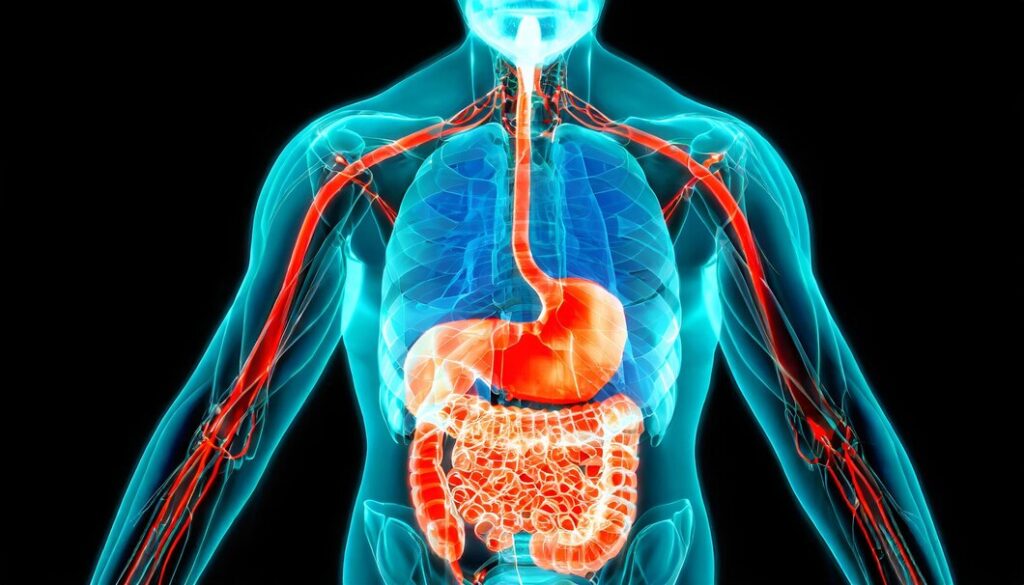Human Digestive System
The digestive system for humans is a sophisticated and multifaceted network of organs and systems that cooperate to digest food into nutrients, absorb those nutrients, and expel waste. This system supplies the energy and raw materials required for growth, repair, and proper bodily function, making it essential for the body’s feeding and upkeep. Numerous hormonal and neurological impulses control the mechanical and chemical processes involved in digestion.

Human Digestive System function
The digestive system in humans breaks down food to extract vital nutrients and energy for everyday activities and the body’s growth and upkeep. There are multiple phases to the digestion process, which happens along the gastrointestinal tract and incorporates both mechanical and chemical activities. The following is a summary of the digestive system’s primary roles in humans.
Consumption:
the action of putting food in the mouth.
Digestion by Mechanical Means:
Food is broken down into tiny bits in the mouth during chewing, or mastication, which increases the surface area of the food for improved enzyme action.
Food passes through the digestive tract due to peristalsis, which is a rhythmic contraction of muscles.
Chemical Breakdown:
Saliva Secretion: Enzymes such as amylase are released by the salivary glands to start the breakdown of carbohydrates.
Proteins are broken down by hydrochloric acid and pepsin, which are found in gastric juice, which is produced by the stomach’s gastric glands.
Pancreatic Digestion: To further break down lipids, proteins, and carbohydrates, the pancreas secretes the digestive enzymes lipase, protease, and amylase into the small intestine.
Production of Bile: The liver generates bile, which is then kept in the gallbladder and expelled into the small intestine to help break down lipids an
Preservation and Disposal:
When not needed right now, nutrients are stored for later use in a variety of tissues.
Once in the large intestine, where water and electrolytes are absorbed and the residual material is converted into feces, waste products and indigestible materials go.
When a person is defecating, their waste is held in the rectum until it is expelled through the anus.
Rules:
Digestive functions are regulated by hormones and brain impulses.
Important hormones include cholecystokinin (which stimulates pancreatic enzyme release and gallbladder contraction), secretin (which stimulates pancreas and bile flow), ghrelin (which stimulates appetite), and gastrin (which stimulates stomach acid production).
Digestion is also regulated by the enteric nervous system, a sophisticated network of neurons in the gastrointestinal tract.
Human Digestive System inportent
The digestive tract of humans is crucial to general health and wellbeing. It is important because it is the main way that the body gets the vital nutrients, energy, and building blocks that it needs to function properly. The following important factors help us understand the significance of the human digestive system.
Nutrient Absorption:
- The digestive system is responsible for breaking down complex carbohydrates, proteins, and fats into simpler forms that can be absorbed in the small intestine.
- Essential nutrients such as vitamins and minerals are absorbed, contributing to various physiological functions in the body.
Energy Production:
- The breakdown of carbohydrates into glucose provides the body with a primary source of energy.
- Fats are also metabolized to produce energy, supporting cellular functions and overall vitality.
Interconnected Systems:
- The digestive system interacts with other body systems, such as the endocrine and immune systems, demonstrating its role in maintaining overall physiological balance.
Disease Prevention:
- A well-functioning digestive system is associated with a lower risk of digestive disorders and diseases, such as gastroesophageal reflux disease (GERD), inflammatory bowel diseases (IBD), and colorectal cancer.
- Proper nutrition and digestion contribute to the prevention of malnutrition-related conditions.
- Microbiota Balance:
- The digestive system houses a diverse community of microorganisms that play a crucial role in digestion, nutrient absorption, and immune function.
- Maintaining a healthy balance of gut microbiota is essential for overall health.
Conclusion
In summary, the digestive system of humans is a wonder of biological engineering, coordinating a number of complex functions to extract vital nutrients from the food we eat. Its good health and continuation of life depend on it continuing to work properly. In order to maintain digestive health and prevent or treat a variety of illnesses, it is essential to comprehend the anatomy, physiology, and regulatory processes of the digestive system. Our understanding of this intricate system is still developing as new study reveals parts of nutrition and digestion, potentially providing insights into better health and overall well-being.